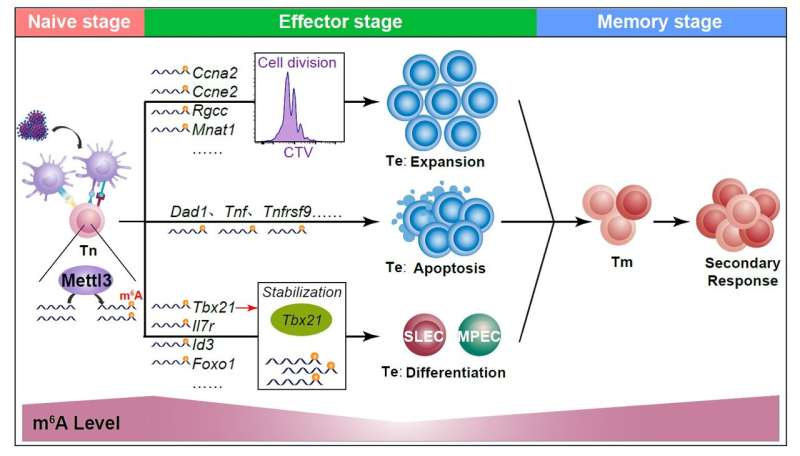This article has been reviewed according to Science X's editorial process and policies. Editors have highlighted the following attributes while ensuring the content's credibility:
fact-checked
trusted source
proofread
Mettl3-dependent m6A modification is essential for effector differentiation and memory formation of CD8+ T cells

This study was led by Dr. Shuyang Yu (College of Biological Sciences, China Agricultural University), Dr. Jingyu Xu (The Collaborative Innovation Center of Tissue Damage Repair and Regeneration Medicine of Zunyi Medical University) and Dr. Xuguang Du (College of Biological Sciences, China Agricultural University) and illustrated the key role of Mettl3 in CD8 T cell response during acute infection model.
CD8 T cells (also known as cytotoxic T lymphocytes) are a key component of the adaptive immune system. Once activated upon encountering antigens, naïve CD8 T cells undergo a rapidly proliferative expansion and differentiate into effector and memory cells, which enhance the protection of organisms by removing foreign pathogens.
With the development of RNA biology, the functions of N6-methyladenosine (m6A) in various cell subsets have been widely reported, while in the CD8 T cell response are less reported. This study emphasized the key role of m6A modifications and elucidated the mechanisms of m6A modification in regulating CD8 T cell response.
The scientists used in vivo infection models and adoptive transfer systems to reveal the key role of Mettl3 during CD8 T cell response. The results showed that the rate of early proliferation is diminished and apoptosis is increased, which results in defective clonal expansion of CD8 T cells.
Further, the number of all effector subsets is severely impaired, though the proportion of short-lived effector cells (SLEC) is reduced while the memory progenitor effector cells (MPEC) is relatively elevated in Mettl3-deficient CD8 T cells. Meanwhile, Mettl3-deficient CD8 T cells significantly reduce the ability of memory formation and secondary response.
To examine the Mettl3-dependent epi-transcriptional regulation in effector CD8 T cells, this study combined transcriptome and m6A modification abundance analysis of effector CD8 T cells. The scientists revealed that Mettl3-dependent m6A modification regulates cell cycle- and differentiation-related genes' expression.
Specifically, Mettl3-mediated m6A modification binds Tbx21 transcript and sustains its stability, allowing normal production of T-bet protein. Ectopic expression of T-bet mainly restores the phenotypic defects in SLEC and MPEC differentiation of Mettl3-deficient CD8 T cells. In summary, this study illustrated that Mettl3-dependent m6A modification regulates CD8 T cell response during the acute infection process.
The paper is published in the journal Science Bulletin.
More information: Wenhui Guo et al, Mettl3-dependent m6A modification is essential for effector differentiation and memory formation of CD8+ T cells, Science Bulletin (2023). DOI: 10.1016/j.scib.2023.11.029



















